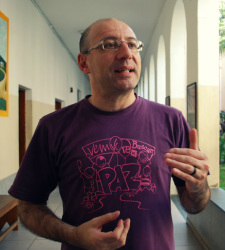PROGRAMAÇÃO
|
PROGRAM |
Quinta, 28/agosto/2014
|
Thursday, August 28th, 2014 |
|
8:30 am Credenciamento e Café da Manhã de Boas Vindas
|
8:30 am Registration and Welcome Breakfast
|
|
9:00 am Abertura
|
|
9:00 am Opening
|

9:20 am Palestrante Chave: Milton Bennett
Dr. Milton J. Bennett fundou e dirige o Instituto de Pesquisa em Desenvolvimento Intercultural de Hillsboro, Oregon e Milão, Itália (http:// www.idrinstitute.org). Ele é também professor adjunto de Comunicação Intercultural na Universidade de Milão-Bicocca e consultor de corporações, universidades e organizações de intercâmbio na Europa, Ásia, e os EUA. Dr. Bennett estudou física e psicologia cognitiva, como parte de seu diploma de Bacharel da Universidade de Stanford, tem mestrado em psicolingüística na Universidade de São Francisco e possui um dos primeiros doutorados em Comunicação Intercultural (Universidade de Minnesota). Uma versão completamente revisada de seu livro didático, “Conceitos básicos da Comunicação Intercultural” foi recentemente publicado com o subtítulo, ‘Paradigmas, Princípios e Práticas’ (Intercultural Press, 2013). O mesmo livro foi publicado em chinês com o título Construindo Comunicação Intercultural (Peking University Press, 2012) e sua publicação em italiano já está programada. (Franco Angeli Press, 2014). Visite o site da IDRAcademy. Competência Intercultural, Agilidade Perceptiva, e Bom Humor Idioma: Inglês Como a competência em comunicação intercultural agrega valor para negócios globais e organizações multiculturais? Para superar a retórica de marketing padrão que muitas vezes se apresenta como uma resposta, esta apresentação vai olhar para alguns estudos clássicos de criatividade e humor e algumas pesquisas em neurociência mais atuais na flexibilidade perceptual. Essas idéias esclarecem por que a comunicação eficaz é a chave para fazer bons negócios, porque a competência em comunicação intercultural é a chave para fazer bons negócios em ambientes multiculturais, e por que a agilidade perceptiva é a chave para derivar o valor da diversidade cultural (tanto quanto o bom humor).
|
9:20 am Keynote Speaker: Milton Bennett
Dr. Milton J. Bennett founded and directs the Intercultural Development Research Institute located in Hillsboro, Oregon and Milano, Italy (http://www.idrinstitute.org). He is also an adjunct professor of intercultural communication at the University of Milano-Bicocca and a consultant on the topic to corporations, universities, and exchange organizations in Europe, Asia, and the US. Dr. Bennett studied physics and cognitive psychology as part of his BA degree from Stanford University, has an MA in psycholinguistics from San Francisco State University and holds one of the first Ph.D.’s in intercultural communication (University of Minnesota). A completely revised version of his textbook, "Basic Concepts of Intercultural Communication" was recently published with the subtitle, 'Paradigms, Principles, and Practices' (Intercultural Press, 2013). The same book was first published in Chinese with the title Constructing Intercultural Communication (Peking University Press, 2012) and it is scheduled for publication in Italian (Franco Angeli Press, 2014). Visit the site of Milton Bennett's IDRAcademy. Intercultural Competence, Perceptual Agility and Good Jokes Language: English How does competence in intercultural communication contribute value to global business and multicultural organizations? To get past the standard marketing rhetoric that often poses as an answer, this presentation will look at some classic studies of creativity and humor and some more current neuroscience research on perceptual flexibility. These ideas clarify why effective communication is the key to doing good business, why intercultural communication competence is the key to doing good business in multicultural settings, and why perceptual agility is the key to deriving value from cultural diversity (as well as to a sense of humor). | ||||||
|
11:20 am Intervalo
|
11:20 am Break
|
|
11:40 am Influência dos fluxos migratórios nas empresas brasileiras
Idioma: Português Quem são estes imigrantes que chegam ao Brasil? De onde vêm? Quantos são? Como afetam as operações das empresas brasileiras? Quais são suas diferentes formas de trabalhar? Como estão sendo recebidos? Que tipos de reputação estão criando? Estão "roubando" empregos de brasileiros? Ou estão suprindo um mercado carente de mão de obra? Padre Paolo Parise discutirá estas e outras questões relacionadas aos fluxos migratórios. Padre Paolo Parise, Doutor pela Universidade Gregoriana de Roma, é Professor no Instituto Teológico de São Paulo e na Roma Scalabrini International Migration Institute. Ele é Diretor do Centro de Estudos Migratórios, sediado na Paróquia Missão Nossa Senhora da Paz, conhecida como Missão Paz, na Baixada do Glicério, no centro de São Paulo. Italiano, escreveu o livro A Arte de Criar, com dinâmicas para jovens, publicado no Brasil, México e Espanha. Chegou pela primeira vez ao Brasil há 16 anos e lidera a Missão Paz desde 2010, acompanhado por mais 3 padres. Juntos com 39 funcionários, 16 estagiários e 40 voluntários, eles acolhem migrantes, imigrantes e refugiados, em média 18 mil pessoas por ano. Em 2013 foram mais de 60 mil atendimentos. Entre as várias atividades da Missão Paz, eles intermediam a contratação dos estrangeiros por empresas brasileiras. As empresas brasileiras têm vindo em números cada vez maiores e para contratar cada vez mais estrangeiros. Padre Paolo irá compartilhar sua perspectiva da internacionalização da empresa brasileira em território nacional.
|

11:40 am How migration has been influencing Brazilian companies
Language: Portuguese Who are these immigrants arriving in Brazil? Where do they come from? How many are there? How do they affect Brazilian operations? How different are their working styles? How are they being received? What kind of reputation are they creating? Are they "stealing" jobs from Brazilians? Or are they serving a market in need? Padre Paolo Parise will discuss these and other questions related to migration in Brazil. Father Paolo Parise, PhD from the Gregorian University in Rome, is Professor at the Theological Institute of São Paulo and at Rome Scalabrini International Migration Institute. He is Director of the Center for Migration Studies, based at the Parish Our Lady of Peace Mission, known as Missão Paz, downtown São Paulo. Italian, he wrote the book The Art of Creating with games for youth, published in Brazil, Mexico and Spain. He first came to Brazil 16 years ago and he leads Missão Paz since 2010, accompanied by three more priests. Together with 39 staff members, 16 interns and 40 volunteers, they welcome migrants, immigrants and refugees, on average 18,000 people per year. In 2013 there were over 60 000 appointments. Among the various services at Missão Paz, they mediate the recruitment of foreigners for Brazilian companies. Brazilian companies have come in increasing numbers and to hire more and more foreigners. Father Paolo will share his perspective of the internationalization of Brazilian companies in national territory. | ||||||
|
12:50 pm Almoço
|
12:50 pm Lunch
|

2:20 pm Reconhecendo e Valorizando Pessoas Diferentes: As 5 Linguagens da Apreciação
Idioma: Português Ines Meneses discute as diversas formas que levam pessoas diferentes a se sentirem valorizadas e reconhecidas. A apresentação pretende provocar o público a refletir sobre como as 5 Linguagens da Apreciação - Tempo de Qualidade, Palavras de Afirmação, Atos de Serviço, Presentes e Toque Físico Apropriado - se traduzem em diferentes partes do mundo. Também vamos discutir sobre como utilizar estes conceitos no desenvolvimento de equipes globais de alta performance. Inspirado no livro The 5 Appreciation Languages in the Workplace (publicado no Brasil sob o título As Cinco Linguagens da Valorização Pessoal no Ambiente de Trabalho), de Gary Chapman e Paul White. Ines Meneses é Presidente da SIETAR Brasil. Desde 2004 no ramo intercultural, Ines dirige a United Globe Consultoria, onde alinha pessoas diferentes em torno de um objetivo comum. Fez MBA pela University of Texas at Austin e seu bacharelado é em Administração de Empresas pela FGV. Trabalhou na Motorola nos Estados Unidos como Gerente Global de Projetos. É certificada em Investigação Apreciativa pela Case Western University, Laboratórios Sociais de Mudança pela Reos Partners, Project Management Professional pelo Project Management Institute e Coach pelo Instituto de Coaching Integrado. Também voluntaria na integração social de refugiados haitianos.
|
2:20 pm Acknowledging and Recognizing Different People: The 5 Appreciation Languages
Language: Portuguese Ines Meneses discusses the various ways that lead different people to feel valued and recognized. The presentation intends to provoke the audience to reflect on how the 5 Languages of Appreciation - Quality Time, Words of Appreciation, Acts of Service, Appropriate Physical Touch and Gifts - translate into different parts of the world. We will also discuss how to use these concepts in the development of high performance global teams. Inspired by the book "The 5 Appreciation Languages in the Workplace" (published in Brazil under the title "As Cinco Linguagens da Valorização Pessoal no Ambiente de Trabalho"), by Gary Chapman and Paul White. Ines Meneses is President of SIETAR Brazil. Since 2004 in the intercultural field, Ines runs United Globe Consulting, where she aligns different people around a common goal. She holds an MBA from the University of Texas at Austin and a Bachelor's degree in Business Administration from FGV. Before following the intercultural field as a career, Ines worked at Motorola in the United States as Global Project Manager. She is certified in Appreciative Inquiry by Case Western University, Social Change Labs by Reos Partners, Project Management Professional by the Project Management Institute and Coach by the Institute of Integrated Coaching. She is also volunteer in the social integration of Haitian refugees. | ||||||
|
3:30 pm Intervalo
|
3:30 pm Break
|
|
3:50 pm Aplicando "Indexicabilidade Social" na compreensão de Interações Interculturais Contestadas
Idioma: Inglês 
Esta apresentação considera maneiras em que os conceitos de "indexicabilidade direta/indireta" são úteis ao analisar exemplos de "interações interculturais falhas ou desafiadoras." Os exemplos incluem uma campanha publicitária mal sucedida da Nike na China, a contestação de alguns vestimentos de Halloween nos Estados Unidos , a disputa sobre certas linguagens ou scripts no "cenário lingüístico público" em Nova York e em Taipei, Taiwan, bem como uma análise de um logotipo de uma empresa em Taiwan que foi contestada pela Starbucks.
A palestra analisa ambos os fenômenos semióticos lingüísticos e não linguísticos em interações interculturais que são bastante relevantes para empreendimentos comerciais internacionais e incluirá tempo para debater exemplos no Brasil. No geral, este material demonstra que devemos prestar muita atenção aos específicos contextos históricos, políticos, econômicos, socioculturais – e linguísticos, para compreender as formas em que as representações semióticas em práticas de negócios podem ser bem-sucedidas ou gerar forte resistência. Melissa L. Curtin (Ph.D., Universidade do Novo México, 2007) realiza encontros interdisciplinares na Universidade da Califórnia, Santa Barbara, onde ela é Pesquisadora e Coordenadora de Projetos Especiais em Linguagem, Cultura e Comunicação; e é Professora Assistente Adjunta de Lingüística, com filiações aos departamentos de Comunicação global e de Estudos Internacionais. Sua pesquisa se concentra na "política de identidade e pertencimento", investigando maneiras em que a linguagem e outros processos sociais semióticos são usados (i) em processos de identificação e diferenciação, (ii) na construção social do lugar, e (iii) no posicionamento de grupos socioculturais com destaques de “pertencimento diferencial". Integrando teorizações de linguagem, identidade, globalização e da comunicação intercultural, sua pesquisa crítica etnográfica está publicada em vários volumes editados (Livro crítico da comunicação intercultural; Buscando identidade: Linguagem em Sociedade; Cenário Linguística: Expandindo o Cenário; Conflito, Exclusão e Dissidência no Cenário Lingüístico) e revistas e jornais (Jornal Internacional de Sociologia da Linguagem; Semiótica Social).
|
3:50 pm Applying “Social Indexicality” in Understanding Contested Intercultural Interactions
Language: English This presentation considers ways in which the concepts of “direct/indirect indexicality” are useful in analyzing examples of “failed or challenged intercultural interactions.” Examples include a failed advertising campaign by Nike in China, the contestation of certain Halloween costumes in the United States, the dispute over certain languages or scripts in the “public linguistic landscape” in New York City and in Taipei, Taiwan, as well as an analysis of a company logo in Taiwan which was contested by Starbucks. On the whole, the talk analyzes both linguistic and nonlinguistic semiotic phenomena in intercultural interactions which are quite relevant to international business ventures and will include time for considering examples in Brazil. Overall, this material demonstrates that we must pay close attention to specific contexts—historical, political, economic, sociocultural, and linguistic—to understand ways in which the semiotic representations in business practices may be successful or strongly resisted. Melissa L. Curtin (Ph.D., University of New Mexico, 2007) holds an interdisciplinary appointment at the University of California, Santa Barbara where she is Researcher & Coordinator of Special Projects in Language, Culture and Communication; and is Adjunct Assistant Professor of Linguistics with affiliations to the Departments of Communication and Global & International Studies. Her research focuses on “identity politics and belonging,” investigating ways that language and other social semiotic processes are used (i) in processes of identification and differentiation, (ii) in the social construction of place, and (iii) in positioning sociocultural groups within frames of “differential belonging.” Integrating theorizations of language, identity, globalization and intercultural communication, her critical ethnographic research is published in several edited volumes (Handbook of Critical Intercultural Communication; Seeking Identity: Language in Society; Linguistic Landscape: Expanding the Scenery; Conflict, Exclusion, and Dissent in the Linguistic Landscape) and peer-reviewed journals (International Journal of Sociology of Language; Social Semiotics). | ||||||
|
4:50 pm Debate
|
4:50 pm Debate
|
|
6:00 pm Fim do 1o dia
|
6:00 pm End of Day 1
|
Sexta, 29/agosto/2014 |
Friday, August 29th, 2014 |
|
8:30 am Registration e Café da Manhã de Boas Vindas
|
8:30 am Registration and Welcome Breakfast
|
|
10:05 am AMCHAM Brasil e processos de internacionalização
Idioma: Português A AMCHAM Brasil exerce papel importante no que se diz respeito à representação do setor privado nas relações bilaterais Brasil e EUA. O Departamento de Comércio Internacional lida diariamente com empresas de diversos setores e tamanhos que estão em processo de internacionalização ou que possuem interesse em explorar o mercado através de outras perspectivas. Lidamos com o choque cultural, burocracia em ambos países e enfrentamos os desafios junto com o empresariado durante o processo de internacionalização. O objetivo da participação é compartilhar cases de sucesso, quais são esses desafios e quais são os nossos choques culturais de cada dia. |
10:05 am AMCHAM Brazil and internationalization processes
Language: Portuguese The AMCHAM Brazil plays an important role regarding the representation of the private sector in bilateral relations between Brazil and USA. The Department of International Trade daily deals with various sectors and sizes that are in the process of internationalization or have interest in exploring the market with other companies prospects. We deal with the culture shock, bureaucracy in both countries and we face together with the businessman the challenges along the process of internationalization. The purpose of this talk is to share success stories, what are these challenges and what are our cultural shocks each day. |
|
Camila Moura é Gerente de Comércio Exterior, Amcham Brasil
Camila é graduada em Relações Internacionais e cursa o MBA Internacional na FIA. Ela trabalha na Câmara Americana de Comércio desde 2005. A Amcham Brasil é a maior dentre todas as 104 existentes nos demais países. Como Gerente de Comércio Exterior, ela é responsável por todos os serviços de promoção comercial oferecidos pela Amcham em todos os 14 escritórios regionais da Câmara no Brasil. Camila coordena missões comerciais para os Estados Unidos, América Latina e China e tem participado na organização de diversos eventos importantes em parceria com o governo brasileiro e americano. Ela também palestra sobre “How to do Business and Invest in Brazil” desde 2009 em eventos no Brasil e nos Estados Unidos, e chefia serviços de consultoria em internacionalização para empresas americanas e brasileiras. Camila morou nos Estados Unidos entre 2000 e 2002, nos estados de Michigan e Texas, onde estudou Negócios Internacionais.
|

Camila Moura is Amcham Brazil Manager of Foreign Trade. Camila's degree in International Relations and pursuing his MBA in International FIA. She works at the American Chamber of Commerce since 2005. The Amcham Brazil is the largest among all the 104 existing in other countries. As Foreign Trade Manager, she is responsible for all trade promotion services offered by Amcham in all 14 regional offices of the chamber in Brazil. Camila coordinates trade missions to the United States, Latin America and China and has participated in organizing various important events in partnership with the Brazilian and American government. She also lecture on "How to do Business and Invest in Brazil" since 2009 at events in Brazil and the United States, and leadership consulting services for internationalization American and Brazilian companies. Camila lived in the United States between 2000 and 2002 in the states of Michigan and Texas, where she studied International Business.
| ||||||
|
11:05 am Intervalo
|
11:05 am Break
|
|
12:25 pm Almoço
|
12:25 pm Lunch
|
|
1:55 pm Gerenciando Equipes Virtuais
Idioma: Português Vamos discutir os diferentes aspectos do gerenciamento de equipes virtuais e multiculturais. No atual contexto corporativo se fazem mais necessárias a utilização de mão de obras em outras localidades, especialmente na modalidade virtual. Como melhor utilizar dessa pratica e quais os desafios? Alfredo Santos é Diretor de TI do operador Logistico JAS Forwarding Worldwide LLC e responsável pelo desenvolvimento de sistemas global;
Graduado em Finanças e TI ,Pós Graduação em Engenharia de Software e Cursando MBA Executivo Internacional. Com experiencia de mais de 14 anos no ramo de TI e 6 em gerênciamento de equipes remotas ja liderou equipes nos paises: Argentina, EUA, Canada, Londres, Alemanha, Australia, Hong Kong, India, Italia, Brazil . Participa também de projetos de pesquisa em gerenciamento complexo, cognitive computing e Pesquisa e Desenvolvimento em parceria da Microsoft/Intel.
|
1:55 pm Managing Virtual Teams
Language: Portuguese We'll discuss the different aspects of the virtual team management and the cultural differences. In the current corporate and market environment external help is required, especially virtual teams. How to best utilize this model and what are the challenges? 
Alfredo Santos is currently the Director of IT for JAS Forwarding Worldwide LLC responsible for the Global Software Development. Bachelors in Finance and IT, Post Grad in Software Engineering and currently going through an International Executive MBA Program. With more than 14 years of experience in the IT field and 6 in Virtual Teams Management in Argentina, EUA, Canada, London, Germany, Australia, Hong Kong, India, Italy and Brazil. Member of several research projects in complexity management, cognitive computing and R&D (Research and Development) in Partnership with Microsoft / Intel.
| ||||||
|
3:00 pm Coaching como chave para destravar o processo de transformação intercultural
Idioma: Português Pelo fato do Coaching ser uma disciplina relativamente nova, a primeira parte da apresentação é dedicada às diferentes definições e modelos de Coaching. Propomos então uma definição de Coaching Intercultural. Em seguida, ilustramos como, no mundo globalizado, o Outro é uma fonte inestimável de conhecimento e desenvolvimento do “Eu”. Como conclusão, após assistir a esta palestra você descobrirá que o Coaching Intercultural é a ferramenta ideal para complementar treinamentos interculturais, auxiliando, assim, corporações, profissionais e famílias expatriadas a alcançarem o sucesso em seus processos de internacionalização. |
3:00 pm Coaching as key to unlock an intercultural transformation process
Language: Portuguese Because Coaching is a relatively new practice, the first part of the presentation is dedicated to introduce different models and definitions of coaching, followed by our definition of intercultural coaching. Then, we illustrate how, in a globalized world, the Other is a unique source of knowledge and development for the Self. As a conclusion for this presentation, you will discover intercultural coaching as an essential tool to complement intercultural trainings, since it helps corporations, expatriate executives and families to achieve success in their internationalization processes. |
|
Roberta Raffaelli é brasileira, graduada em Psicologia pela PUC-SP, pós graduada em Gerenciamento de Recursos Humanos pelo Fanshawe College, no Canadá, certificada como Coach pelo NeuroLeadership Group (NLG), ACC (Associate Certified Coach) pela International Coach Federation (ICF) e qualificada nos instrumentos MBTI e EQi (Inteligência Emocional). Possui 18 anos de experiência em gestão de Recursos Humanos, sendo os últimos 5 dedicados ao Coaching e Desenvolvimento Intercultural. Fala fluentemente inglês e espanhol e avançados conhecimentos de italiano e francês, tendo vivido como expatriada em Luxemburgo e no Canadá. Atualmente é Coach Intercultural, sócia da Transition Coaching, Mentora para o NLG e Presidente do International Newcomers Club.
|

Roberta Raffaelli is Brazilian, graduated in Psychology from PUC-SP, post graduated in Human Resource Management at Fanshawe College in Canada, coach certified by NeuroLeadership Group (NLG), ACC (Associate Certified Coach) by the International Coach Federation (ICF) and qualified in MBTI instruments and EQI (Emotional Intelligence). Has 18 years experience in HR management, with the last 5 dedicated to Coaching and Intercultural Development. She speaks fluent English and Spanish and has advanced knowledge of Italian and French, lived as an expatriate in Luxembourg and Canada. Currently is an Intercultural Coach, a member of Transition Coaching, Mentor for the NLG and Chairman of the International Newcomers Club.
| ||||||
|
4:00 pm Intervalo
|
4:00 pm Break
|
|
4:20 pm A importância do auto-conhecimento no processo cultural
Idioma: Português Motivada pela afirmação de Hall: "the real job is not to understand foreign culture, but to understand our own" (1973), a apresentação tem como argumento uma visão crítica da identidade brasileira e a importância desse auto-conhecimento cultural nos processos de construção de alinhamento de valores e engajamento de integrantes nas internacionalização das empresas. Procuraremos analisar as dinâmicas históricas do processo de construção de valores da cultura brasileira e como os comportamentos do executivo brasileiro, consequentes desses valores, são compreendidos em ambientes multiculturais. Mariana de Oliveira Barros é sócia-fundadora da Differänce Intercultural e Vice-Presidente da Sietar Brasil. Graduada e Mestre em Relações Internacionais, Mariana atua há 15 anos como consultora intercultural na internacionalização de executivos e empresas multinacionais e brasileiras.
|

4:20 pm The importance of self-awareness in cultural process
Language: Portuguese Motivated by Hall's claim: "the real job is not to understand foreign culture, but to understand our own" (1973), the presentation takes as argument a critical view of Brazilian identity and the importance of this cultural self-knowledge in the building processes of aligning values and engaging team members in the companies' internationalization. We will analyze the historical dynamics of the construction process of Brazilian cultural values and how the behaviors of the Brazilian executives, consequence of these values, are understood in multicultural environments. Mariana de Oliveira Barros is founding partner of Differänce Intercultural and Vice-President of SIETAR Brazil. Bachelor's and Master's degree in International Relations, Mariana has worked for 15 years as a intercultural consultant in the internationalization of executives and multinational and Brazilian companies. | ||||||
|
5:20 pm Encerramento
|
5:20 pm Closure
|
|
6:00 pm Fim do 2o dia
|
6:00 pm End of Day 2
|




